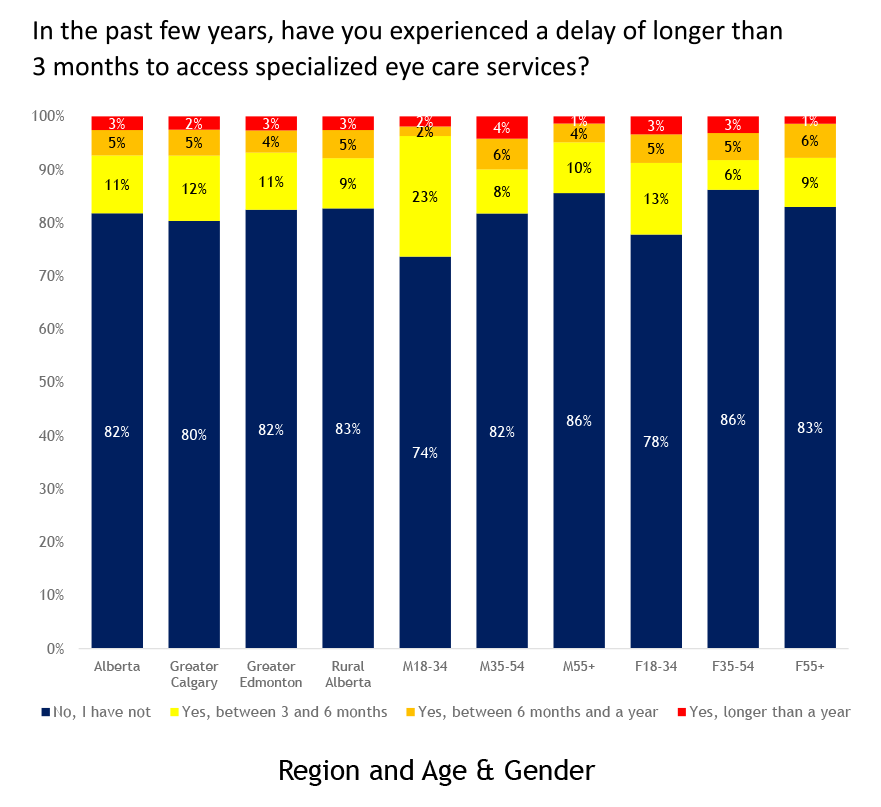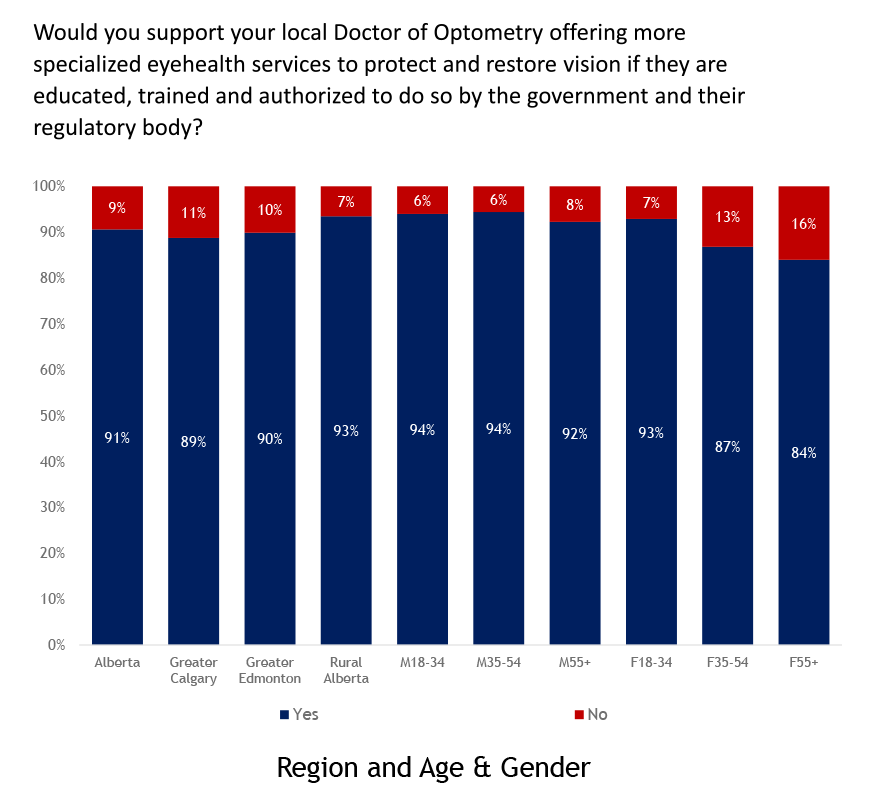Optometrist Scope Expansion
Doctors of Optometry practice in more than 100 cities and towns across Alberta, providing broad-based, accessible and cost-effective vision care. Our members are educated and clinically trained to deliver skilled and competent care. They are committed to public safety, the preservation of sight and the mitigation of vision loss for all Albertans.
The Alberta College of Optometrists is seeking a responsible expansion to the legislated scope of practice. This includes authorization to perform minor laser treatments, injections, and superficial skin surgical procedures such as the removal of skin tags, warts and other surface lesions.
In October 2025, Primary and Preventative Health Services Minister Adriana LaGrange expressed support for expanding the optometry scope of practice in Alberta. This positions Alberta as a leader in eye health care across Canada and reflects a modernization the ACO has championed for more than five years.
We are encouraged by the government’s recognition of the benefits this expanded scope brings in meeting the health care goals of Albertans, as outlined in the Lead the Way: What We Heard report and the Health Workforce Strategy. The ACO is committed to working with the government to ensure the scope expansion is implemented and approved, and our Council has appointed an Optometry Scope Expansion Committee to carry out that work.
Like government, our focus is on providing faster, fairer and more appropriate access to care, particularly in rural, remote and Indigenous communities.
Optometrists are Albertans’ greatest defense against vision loss, especially in rural communities. The Alberta College of Optometrists (ACO) ensures Doctors of Optometry can offer the highest levels of safe and competent eye care to all Albertans.
Advances in the education and training of Alberta optometrists have outpaced the current regulated scope of the profession. That’s why the ACO is requesting an update to our legislation that will authorize Doctors of Optometry to perform limited laser (e.g. to treat glaucoma) and superficial skin procedures (e.g. removal of skin tags).
Our scope expansion submission represents a sustainable and cost-effective way to limit and guard against vision impairment and loss, and to improve the delivery of health services to Albertans – particularly in rural areas.
- Doctors of Optometry are highly trained and skilled. Optometrists have been providing these same limited laser and superficial skin procedures in other North American jurisdictions for over 40 years in a safe and skilled manner. This authorization has never been repealed or scaled back in any jurisdiction due to concerns over the quality of care provided by optometrists.
- With their 4-year doctoral-level university education (following a BSc program), Doctors of Optometry have the knowledge, skills and competencies to provide these requested procedures safely and proficiently.
- The Alberta College of Optometrists will mandate that all practitioners who provide these services complete a rigorous certification course including a final exam – just as we did for all previous optometric scope expansions. This is in our patients’ best interest and part of our obligation as a College to protect the public.
- Doctors of Optometry work in more than 100 communities across Alberta. Our members ensure Albertans receive high-quality and accessible vision care services in their local community. This is especially important for rural and Indigenous populations.
The threat of eye disease and permanent vision loss increases with age. Albertans will require better access to skilled and competent eye care providers in the coming decades. Doctors of Optometry are the most accessible and affordable providers of this care. Optometrists authorized to diagnose and treat a greater range of conditions are essential to the future planning of Alberta’s health system, ensuring the provision of evidence-based, outcome-focused, cost-effective and timely health care.
Specifically, benefits of the proposed scope expansion include:
- Greater access to vision care services in all areas of the province. This is especially important to rural, remote and Indigenous populations.
- Improved health outcomes.
- Reduced government payments for glaucoma medications for seniors.
- Reduced pressure on family physicians and walk-in clinics by diverting patients who require vision care services to optometrists who are trained and technologically equipped to diagnose and treat eye disorders, diseases and injuries.
- Reduced pressure on emergency departments.
- Assurance that only those who have successfully completed a rigorous certification course/final exam or a program of study accepted by the College would be authorized to provide any of the proposed new activities.
- This proposal is aligned with the Health Minister’s mandate from the Premier to address rural health challenges by leveraging the scope of allied health professionals.
-
- It supports efforts to improve emergency medical services response times, decrease surgical backlogs and cut emergency room wait times.
- Specific government initiatives that scope expansion aligns with include the Health Care Action Plan, the Modernizing Alberta’s Primary Health Care System (MAPS) initiative, Alberta Health’s 2023-2026 Business Plan, and the objectives of the government’s Red Tape Reduction.
-
Advances in the education and training of Alberta optometrists have outpaced their existing scope of practice. Doctors of Optometry are educated and clinically trained to practice at a higher level than legislated.
Updating the Health Professions Restricted Activity Regulation (HPRAR) (formerly the Optometrists Profession Regulation) to maintain a closer pace with modern education and clinical training offers more efficient care to Albertans, improved health outcomes, reduced costs to the government and continued protection of the public interest.
Adding scope also enhances the benefit of private-sector optometry clinics offering new services in urban and rural settings outside of Alberta Health Services facilities.
- Doctors of Optometry receive 7-8 years of training followed by an optional, one-year post-graduate residency in a variety of subspecialties.
- Students also complete clerkship placements under the direct supervision of a Doctor of Optometry or ophthalmologist, outside of the university optometry clinic.
- The College will mandate that all currently registered Doctors of Optometry who wish to provide any newly authorized activity participate in and successfully complete a rigorous, validated certification course and final exam.
- No “grandfathering” of any Regulated Member will occur. Newly graduated applicants to the ACO will have completed the Advanced Procedures certification course syllabus during their optometry program and must successfully pass the Optometry Examining Board of Canada Exam before a Practice Permit is issued.
Advanced Procedures certification courses:
- Created, accredited, and administered by accredited universities. The University of Waterloo School of Optometry and Vision Science, the Northeastern State University Oklahoma College of Optometry and other similarly accredited programs offer these post-graduate certification courses.
- Taught by certified ophthalmologists and optometrists.
- Augment what students and practitioners have learned during their professional degree program, clerkship placements, previous Advanced Scope certification courses and previously completed Continuing Education courses/wetlabs.
- Refresh clinical knowledge and skill sets while updating the Doctor of Optometry on new best practice modalities and protocols for treating any potential complications following the provision of these procedures.
The current 32.5-hour Advanced Procedures certification course content is split between injections, minor surgical and laser modules. It incorporates both didactic lectures and hands-on clinical wet labs with an emphasis on the hands-on components.
The vast majority of Albertans support their local optometrist providing more specialized eye health services that currently require a referral to an ophthalmologist or other specialist.
A recent survey commissioned by the ACO found 93% of rural Albertans support the additional services being provided by their local Doctor of Optometry if they are educated, trained and authorized to do so by the government and their regulatory body.
The survey also found that 19% of Albertans have experienced a delay of over three months in accessing specialized eye care services.
The survey of 1500 Albertans was conducted in April 2024 by One Persuasion and has a margin of error of +/- 2.5%.



